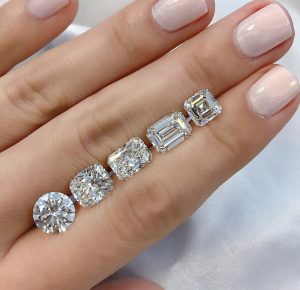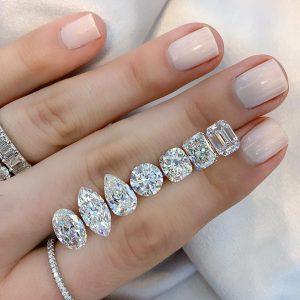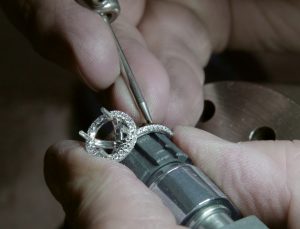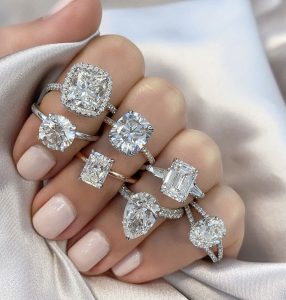There are engagement rings or diamonds misconceptions and myths circulating around the internet that often lead to buyer frustration and confusion. Nowadays, with the click of a button we have thousands of resources available, and when it comes to navigating diamond quality and ring pricing, in general, you can easily find yourself overwhelmed with contradictory information. For this reason – we will be explaining the 6 most common diamond and engagement ring misconceptions in-depth to help simplify the buying process!
Six Most Common Engagement Ring & Diamond Myths
#1 – Fluorescence is bad
Simply googling fluorescence in diamonds often leads searchers to believe all diamonds with fluorescence appear milky, hazy, and even shine blue. However, not all diamonds with fluorescence exhibit these negative effects. In fact, most diamonds with fluorescence enhance the stone’s color as these slight undertones counteracts warmer hues given off by near-colorless diamonds. For example, envision comparing two I-colored diamonds – one with no fluorescence and one with strong blue. It surprises most to learn the diamond with strong blue fluorescence actually appears whiter and brighter than the diamond without. Though it is true there are diamonds that do exhibit the negative effects of fluorescence – this does not apply to all diamonds with fluorescence. At Lauren B we hand select all of the diamonds in our inventory and do not stock diamonds that are milky or hazy!
Check out our blog post all about fluorescence here!
#2 – An SI1 or SI2 clarity stone is a bad investment
Stones within the SI1 and SI2 clarity range are classified as being ‘slightly included’ and sometimes these inclusions could be noticeable to the naked eye. This grading scares many away from opting for stones within this range, as no one wants to buy a diamond with visible imperfections. Most don’t know that many diamonds in the SI1 and SI2 range actually have transparent or white imperfections that are easily hidden within the facets or are located where they cannot be seen to the naked eye. Every diamond is different so there are better and worse SI graded diamonds– the key is being able to look at a diamond and decipher whether or not it is eye clean. Some SI1 stones even have fewer, less prominent imperfections than VS2 options, and this can end up saving you money in the long run.
#3- An engagement ring should cost 3 months salary
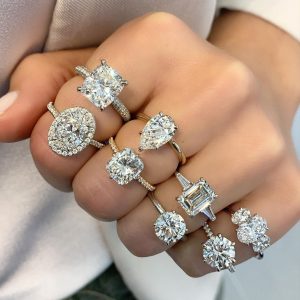
Today there are no set rules for engagement rings. The notion that a ring should cost 3 months salary is quite outdated and rarely the norm in today’s world. At Lauren B your design consultant will urge you to spend only what you are comfortable spending. Some people save for years to achieve a particular size stone – while others do not. As a buyer, the best way to get the most bang for your buck is by doing your research and staying informed while spending within your means.
For those who wish to be more conservative spenders, lab-grown diamonds, moissanite or colored gemstones are a budget-friendly diamond alternative. Additionally, we have a range of diamond rings in stock to fit a majority of price ranges.
#4- Customizing a ring is more expensive
Staying on the topic of pricing – the next misconception is one we are frequently asked about at Lauren B. Unlike most jewelers – at Lauren B most of our clients opt to customize their ring to incorporate the style elements they prefer within their personal budget. Many of our clients are shocked to find out that customizing an engagement ring with us can actually save you money! Customizing gives both freedom and flexibility to make a ring uniquely your own, and you also will save more money down the road in repairs and alterations because the ring is customized to the exact dimensions of the diamond and to the wearer’s finger size. This means the integrity of the design and the quality of the ring is much higher than something mass-produced – which is how most rings on the market are made. Custom-made rings certainly have a cleaner and more elegant appearance, as well, meaning you will be less likely to want to upgrade later on!
Watch this video to see how our beautiful in-stock and custom rings are handmade!
#5 – Fancy Shapes are more expensive
Many believe that fancy-shaped diamonds, which are any shape besides a round shape, are more expensive! This is actually a huge misconception – as round brilliant diamonds will always be the most expensive diamond shape. This is because round diamonds are not only the most brilliant, they are also the most popular and there is a much higher demand for them. In addition, round diamonds are actually more expensive to cut as more of the rough is cut away to achieve that perfect, round shape.
#6 – Certain Metal Colors are Trendy
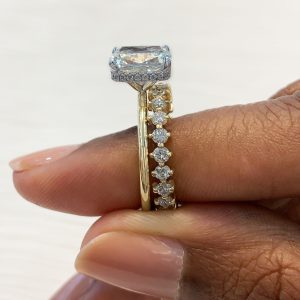
In the last few years, yellow gold and rose gold have become much more common metal color choices. This spike in popularity has left many brides-to-be apprehensive about choosing a style in yellow or rose gold because in a few years it could be seen as ‘trendy’. The fact of the matter is that there are only 4 metal colors that have been used in bridal jewelry dating back decades. Both yellow gold and rose gold have been used in jewelry for hundreds of years, tracing back to royal families all across the world. Just like anything else, metal colors can have a surge in popularity, however, at the end of the day, there always has been white gold, yellow gold, rose gold, and platinum. These metal colors have always been widely available and they will continue to be, so arguably, they could all be considered classic and will stand the test of time! We also love how surprised our clients are when they see how flattering rose gold is on every skin tone and how white diamonds appear in yellow and rose gold settings.
In conclusion – these 6 common misconceptions surrounding diamond engagement rings are often the cause of hesitation when it comes to choosing a specific stone or style. Your design consultant is here to help you sort through these misconceptions and narrow down what works best for your personal preferences!
Please email [email protected] for more information regarding the ring design process!

